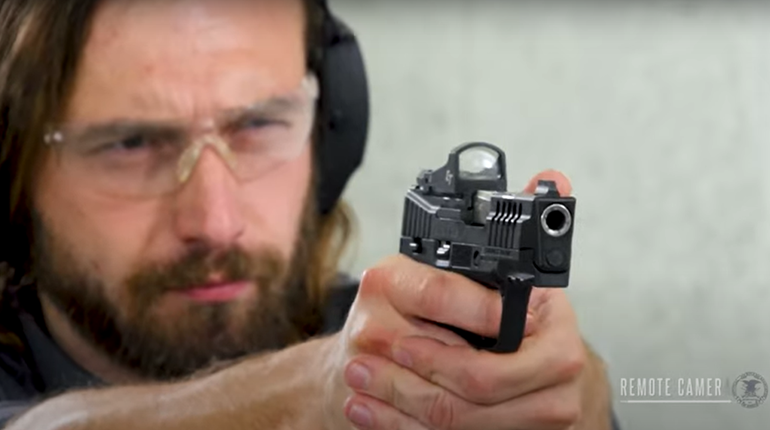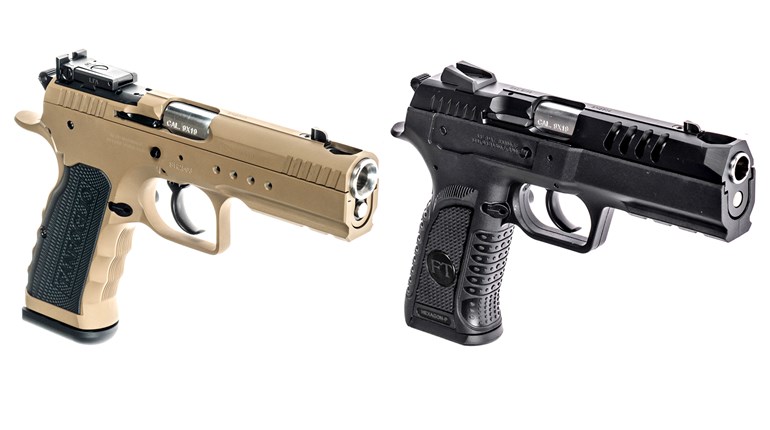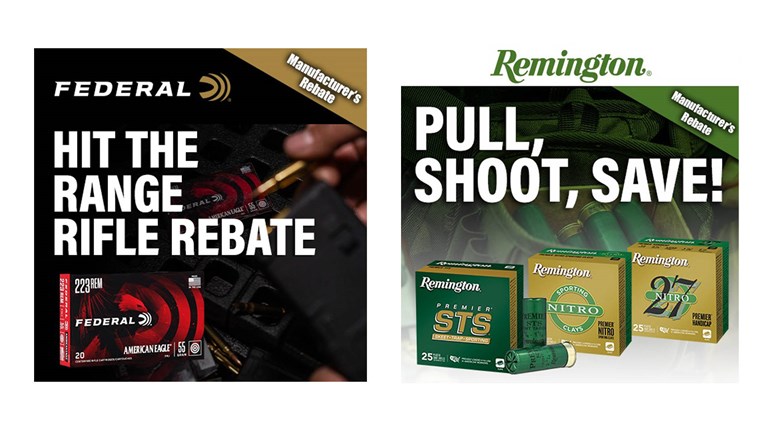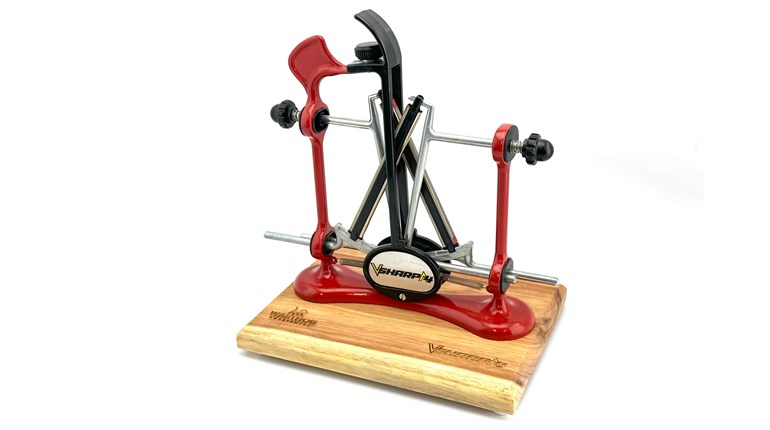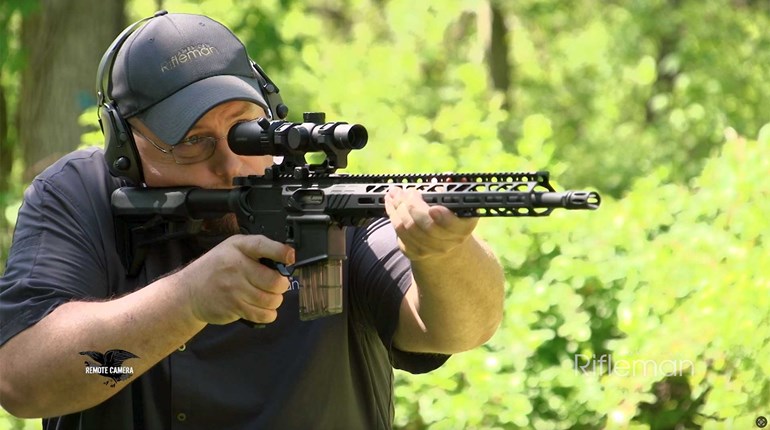
In the early ’80s, country-music artist Barbara Mandrell delivered a mild slap in the face of so-called trendsetters when she sang, “I was country when country wasn’t cool.” Considering Colt’s history with the .380 ACP cartridge, the company could easily steal that line and modify it to have the same effect: “We made a .380 when the .380 wasn’t cool.” Today, semi-automatic pistols in .380 ACP are officially cool—actually more like red hot—and everyone is making them. But Colt has been doing it for more than 100 years, first with the Model 1908 Hammerless and more recently with the Mustang series that, coincidentally, came out not long after Mandrell’s hit song.
 Now Colt has made an interesting move in modernizing its Mustang pocket pistol. The company is building the gun with a polymer frame, but keeping the 1911-style design. I think the new Mustang XSP is one of the coolest .380 pistols to come from Colt yet.
Now Colt has made an interesting move in modernizing its Mustang pocket pistol. The company is building the gun with a polymer frame, but keeping the 1911-style design. I think the new Mustang XSP is one of the coolest .380 pistols to come from Colt yet.
The Mustang XSP is a locked-breech, semi-automatic pistol with a magazine capacity of six rounds. It is just 5.5 inches long, weighs less than 12 ounces and appears to be a 1911 built for Lilliputians. However, this little handgun has several features not found on most 1911s—or even on original Mustangs for that matter. The obvious distinction is the polymer frame, but look further for some other, more subtle differences incorporated into the new design.
For example, the frontstrap and backstrap are heavily dimpled, and the sides of the XSP grip have a pebbled surface to aid control during rapid firing. (Anyone who chooses a concealed-carry pistol chambered for the .380 ACP—or any other defensive cartridge—should train to fire multiple shots in order to stop a threat.) There is a small shelf molded into both sides of the frame just under the ambidextrous safety levers. It’s exactly where the thumb of your shooting hand should be after you disengage the safety and are ready to fire.
 A relief cut behind the trigger guard permits a slightly higher grip on the gun and places your strong hand closer to the bore axis. Though the cut is minimal, it does make the pistol feel more secure in your hand. Recoil from a .380 ACP isn’t difficult to manage, but every bit of grip enhancement helps on a gun this small. Another bonus is the flared extension of the frame above the backstrap. It may not warrant being called a beavertail, but it is slightly wider than on original Mustangs and a bit more comfortable.
A relief cut behind the trigger guard permits a slightly higher grip on the gun and places your strong hand closer to the bore axis. Though the cut is minimal, it does make the pistol feel more secure in your hand. Recoil from a .380 ACP isn’t difficult to manage, but every bit of grip enhancement helps on a gun this small. Another bonus is the flared extension of the frame above the backstrap. It may not warrant being called a beavertail, but it is slightly wider than on original Mustangs and a bit more comfortable.
The front of the frame has a tiny, single-slot accessory rail. Thanks to the squared-off trigger guard, a small weaponlight or laser will mount to the frame nicely. Neither of these two features changes the height or width of the XSP from the dimensions of the earlier Mustang Pocketlite, but they can definitely affect holster selection. Don’t assume the Mustang XSP will fit in the same holster as the Pocketlite or older Mustang versions.
 The slide and barrel of the XSP are machined from stainless steel bar stock, and the slide has a black finish to match the frame. Colt made a couple of minor, but relevant, changes to the XSP slide. Fat fingers sometimes have difficulty manipulating the slide on a pistol this small. The company enhanced the vertical serrations at the rear of the slide to facilitate manual operation of the gun, and the aggressive cuts help. Both the front and rear sight are dovetail-mounted in the slide. You may or may not want to adjust them for windage, but should you choose to install more visible sights, dovetail cuts make that a much easier job.
The slide and barrel of the XSP are machined from stainless steel bar stock, and the slide has a black finish to match the frame. Colt made a couple of minor, but relevant, changes to the XSP slide. Fat fingers sometimes have difficulty manipulating the slide on a pistol this small. The company enhanced the vertical serrations at the rear of the slide to facilitate manual operation of the gun, and the aggressive cuts help. Both the front and rear sight are dovetail-mounted in the slide. You may or may not want to adjust them for windage, but should you choose to install more visible sights, dovetail cuts make that a much easier job.
The XSP has a number of safety features. Perhaps the most significant is the ambidextrous, frame-mounted thumb safety, which blocks hammer movement. The thumb safety can be engaged while the hammer is cocked or at rest, and with the slide either forward or locked back. If the safety is engaged with the hammer cocked, you can still manually cycle the slide. However, if the safety is engaged with the hammer forward, the slide will not cycle. This is an important point to remember, particularly if you carry your pistol with the magazine loaded, chamber empty, hammer down and safety engaged. In this condition, you cannot cycle the slide of the XSP to load the chamber unless you first disengage the safety.
 Large handguns are easy to shoot but difficult to hide, while small handguns are easy to hide but difficult to shoot—or so the saying goes. The Mustang XSP provided some contradictions to that bit of wisdom. Its gentle recoil made the pistol pleasant to shoot, while its sights made it easy to get hits, at least under the right conditions. The black, square-notch rear sight combined with the nearly vertical rear surface of the black front blade to present a crisp sight picture. And although the XSP is quite small, it still had that familiar 1911 feel in my hands. The single-action trigger pull was crisp but slightly heavy, averaging 6 pounds, 4 ounces. Head shots at 25 yards weren’t difficult to make, but only in bright daylight and on a light-colored target. The front blade stood out clearly, with highly visible bands of light showing around both sides of the sight. Even without my corrective lenses, the sight picture—though blurred—was good enough for me to repeatedly produce solid hits on a white silhouette target at 25 yards. When I switched to a dark target, things got more difficult. With corrective lenses, I could distinctly see the front blade in the rear notch, but no light was visible around the blade. It took noticeably longer for me to acquire the front sight and determine whether it was on the target. What did help was the XSP’s similarity to—as well as my own familiarity with—1911 pistols. For me, the XSP had natural pointing characteristics, meaning during presentation it came up on target with both sights pretty much in line.
Large handguns are easy to shoot but difficult to hide, while small handguns are easy to hide but difficult to shoot—or so the saying goes. The Mustang XSP provided some contradictions to that bit of wisdom. Its gentle recoil made the pistol pleasant to shoot, while its sights made it easy to get hits, at least under the right conditions. The black, square-notch rear sight combined with the nearly vertical rear surface of the black front blade to present a crisp sight picture. And although the XSP is quite small, it still had that familiar 1911 feel in my hands. The single-action trigger pull was crisp but slightly heavy, averaging 6 pounds, 4 ounces. Head shots at 25 yards weren’t difficult to make, but only in bright daylight and on a light-colored target. The front blade stood out clearly, with highly visible bands of light showing around both sides of the sight. Even without my corrective lenses, the sight picture—though blurred—was good enough for me to repeatedly produce solid hits on a white silhouette target at 25 yards. When I switched to a dark target, things got more difficult. With corrective lenses, I could distinctly see the front blade in the rear notch, but no light was visible around the blade. It took noticeably longer for me to acquire the front sight and determine whether it was on the target. What did help was the XSP’s similarity to—as well as my own familiarity with—1911 pistols. For me, the XSP had natural pointing characteristics, meaning during presentation it came up on target with both sights pretty much in line.
A shooting session at a nearby indoor range confirmed what I learned outdoors. As ambient light diminishes, effective range decreases and group sizes increase. The exercises I went through at the indoor range consisted of using half-scale silhouette targets at 7 to 25 yards in front of the firing line. One type of target had a black silhouette on a white background, with white scoring circles inside the silhouette. The other target was the reverse: a white silhouette with black rings on a black background. I started with the white silhouette at 7 yards, which put my offhand, slow-fire groups at about 2 inches.
The next exercise involved putting six rounds into each type of target for time, first at 7 yards and then at 10 yards. Ammunition was a mixture of Cor-Bon 90-grain JHP and Remington Express 95-grain Metal Case (MC) loads, along with some cast-bullet reloads that have been in my garage for about 20 years. The total group size for 12 shots was 4.5 inches on the white silhouette and 7.5 inches on the black. When I sped up my firing rate to about one round per second—as fast as my local indoor range permits—7-yard groups with the mixed ammunition stayed inside 5 inches on the white target.
Just for grins, I moved one of each target to 25 yards for some slow-fire shooting. All six shots were in the torso of the half-scale white silhouette, while surprisingly, four of the six shots hit the black silhouette. Admittedly, I cheated on the black target by first acquiring a sight picture against the white background and then sliding the gun into the black section while trying to maintain sight alignment. I could not really see a sight picture once the background changed. Considering my deteriorating vision and light dependency, I wasn’t unhappy with the Mustang’s ability to provide protection, even without the use of my ever-present pocket flashlight.
 Semi-automatics with short slides can be fussy in their eating habits, and the XSP was no exception. The pistol cycled all the test ammo most of the time and some of the ammo all the time. It seemed to prefer the moderate loads, with a strong affinity for the Remington 95-grain MC. It also liked the lighter-weight bullets, running well with Cor-Bon 70-grain Pow’RBall and DoubleTap 80-grain Barnes TAC-XP loads. The XSP functioned most of the time with the Cor-Bon 95-grain JHP load, while it experienced a hiccup about every second or third magazine with the Remington 102-grain Golden Saber and DoubleTap 95-grain JHP loads. I wish I knew what was in those old cast-bullet loads, because the little pistol just gobbled them up and spit them out with complete reliability.
Semi-automatics with short slides can be fussy in their eating habits, and the XSP was no exception. The pistol cycled all the test ammo most of the time and some of the ammo all the time. It seemed to prefer the moderate loads, with a strong affinity for the Remington 95-grain MC. It also liked the lighter-weight bullets, running well with Cor-Bon 70-grain Pow’RBall and DoubleTap 80-grain Barnes TAC-XP loads. The XSP functioned most of the time with the Cor-Bon 95-grain JHP load, while it experienced a hiccup about every second or third magazine with the Remington 102-grain Golden Saber and DoubleTap 95-grain JHP loads. I wish I knew what was in those old cast-bullet loads, because the little pistol just gobbled them up and spit them out with complete reliability.
I mentioned earlier the differences in the shape of the XSP may negate the use of holsters designed for the original Mustang configuration. The XSP is a new pistol, and few companies currently make carry gear specifically for it. However, in digging through some Galco holsters used in previous pocket-pistol projects, I came up with two excellent selections that fit perfectly—both were made for the Kimber Solo.
The first holster is the Tuck-N-Go inside-the-waistband model, constructed of premium steerhide with a natural finish. The other outstanding candidate is the Galco Pocket Protector. Given the XSP’s minimal width and weight, you may choose to carry it in a pocket. When the pistol is snugly inserted into the Pocket Protector, there is still room between the holster and the frontstrap to get a proper grip while the gun and holster remain in your pocket.
While Colt may not have been responsible for the recent .380 ACP craze, the company offered pocket pistols in the chambering long before it became trendy. The Mustang XSP is a fitting response to what many citizens now want to carry for personal protection. This new chapter in Colt’s long history with the cartridge and pistols made for it may be the best one yet.


The beavertail and thumb safety show a connection to the 1911, but the polymer frame suggests a departure from old slabsides.
The Mustang XSP is a locked-breech, semi-automatic pistol with a magazine capacity of six rounds. It is just 5.5 inches long, weighs less than 12 ounces and appears to be a 1911 built for Lilliputians. However, this little handgun has several features not found on most 1911s—or even on original Mustangs for that matter. The obvious distinction is the polymer frame, but look further for some other, more subtle differences incorporated into the new design.
For example, the frontstrap and backstrap are heavily dimpled, and the sides of the XSP grip have a pebbled surface to aid control during rapid firing. (Anyone who chooses a concealed-carry pistol chambered for the .380 ACP—or any other defensive cartridge—should train to fire multiple shots in order to stop a threat.) There is a small shelf molded into both sides of the frame just under the ambidextrous safety levers. It’s exactly where the thumb of your shooting hand should be after you disengage the safety and are ready to fire.

A small weaponlight or laser sight can be mounted on the XSP’s accessory rail—a rare feature on such a small handgun.
The front of the frame has a tiny, single-slot accessory rail. Thanks to the squared-off trigger guard, a small weaponlight or laser will mount to the frame nicely. Neither of these two features changes the height or width of the XSP from the dimensions of the earlier Mustang Pocketlite, but they can definitely affect holster selection. Don’t assume the Mustang XSP will fit in the same holster as the Pocketlite or older Mustang versions.

Features like the ambidextrous safety and rudimentary beavertail show the planning that went into the design of the XSP.
The XSP has a number of safety features. Perhaps the most significant is the ambidextrous, frame-mounted thumb safety, which blocks hammer movement. The thumb safety can be engaged while the hammer is cocked or at rest, and with the slide either forward or locked back. If the safety is engaged with the hammer cocked, you can still manually cycle the slide. However, if the safety is engaged with the hammer forward, the slide will not cycle. This is an important point to remember, particularly if you carry your pistol with the magazine loaded, chamber empty, hammer down and safety engaged. In this condition, you cannot cycle the slide of the XSP to load the chamber unless you first disengage the safety.

Enhanced serrations on the stainless steel slide aid in charging the XSP. The dovetail sights can be adjusted or replaced without difficulty.
A shooting session at a nearby indoor range confirmed what I learned outdoors. As ambient light diminishes, effective range decreases and group sizes increase. The exercises I went through at the indoor range consisted of using half-scale silhouette targets at 7 to 25 yards in front of the firing line. One type of target had a black silhouette on a white background, with white scoring circles inside the silhouette. The other target was the reverse: a white silhouette with black rings on a black background. I started with the white silhouette at 7 yards, which put my offhand, slow-fire groups at about 2 inches.
The next exercise involved putting six rounds into each type of target for time, first at 7 yards and then at 10 yards. Ammunition was a mixture of Cor-Bon 90-grain JHP and Remington Express 95-grain Metal Case (MC) loads, along with some cast-bullet reloads that have been in my garage for about 20 years. The total group size for 12 shots was 4.5 inches on the white silhouette and 7.5 inches on the black. When I sped up my firing rate to about one round per second—as fast as my local indoor range permits—7-yard groups with the mixed ammunition stayed inside 5 inches on the white target.
Just for grins, I moved one of each target to 25 yards for some slow-fire shooting. All six shots were in the torso of the half-scale white silhouette, while surprisingly, four of the six shots hit the black silhouette. Admittedly, I cheated on the black target by first acquiring a sight picture against the white background and then sliding the gun into the black section while trying to maintain sight alignment. I could not really see a sight picture once the background changed. Considering my deteriorating vision and light dependency, I wasn’t unhappy with the Mustang’s ability to provide protection, even without the use of my ever-present pocket flashlight.

The squared trigger guard, polymer frame and front rail distinguish the XSP, while the ambidextrous safety provides easy operation for lefties.
I mentioned earlier the differences in the shape of the XSP may negate the use of holsters designed for the original Mustang configuration. The XSP is a new pistol, and few companies currently make carry gear specifically for it. However, in digging through some Galco holsters used in previous pocket-pistol projects, I came up with two excellent selections that fit perfectly—both were made for the Kimber Solo.
The first holster is the Tuck-N-Go inside-the-waistband model, constructed of premium steerhide with a natural finish. The other outstanding candidate is the Galco Pocket Protector. Given the XSP’s minimal width and weight, you may choose to carry it in a pocket. When the pistol is snugly inserted into the Pocket Protector, there is still room between the holster and the frontstrap to get a proper grip while the gun and holster remain in your pocket.
While Colt may not have been responsible for the recent .380 ACP craze, the company offered pocket pistols in the chambering long before it became trendy. The Mustang XSP is a fitting response to what many citizens now want to carry for personal protection. This new chapter in Colt’s long history with the cartridge and pistols made for it may be the best one yet.

null










